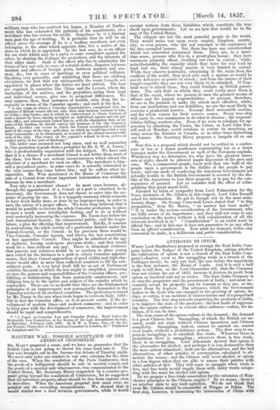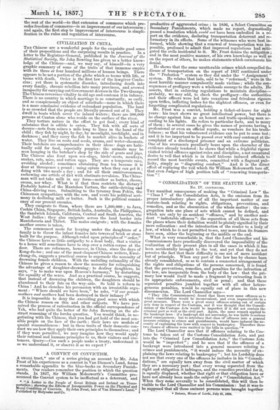ANTIDOTES TO OPIUM.
WHEW Lord Shaftesbury proposed to arraign the East India Company before the Judges of the United Kingdom, asking whether the cultivation of opium is not a breach of the East India Company's charter, even as the smuggling trade is a breach of the Pottinger treaty, he only put half the ease before the magistrate in the first instance, the House of Lords. And it is only a half reply to tell him, as the Lord Chancellor did, that the Company does not violate the act of 1833, because it derives its profit from opium as landlord and not as trader. The East India Company is at once the proprietor and the government of India ; and must necessarily accept its property and its tenants as they are, or improve them by degrees. The advances which the Government makes to the ryots who are engaged in the growing of °phalli indigo, or cotton, is an incident of vicious tenure and of a pauperized tenantry. The first step towards improving the products of India, ' is to improve the state of the producer ; the best mode of supPressing the opium culture is to extend other cultures—cotton, for instance, if it can be done. The true cause of the opium culture is the demand ; the demand is a great Chinese fact. Smuggling, of which the British are accused, could not exist without Chinese incentives and Chinese complicity. Smuggling, indeed, cannot be carried on, cannot even begin, without a prohibitory system. The first step to supersede smuggling is, to establish free trade. Wherever there is prohibition there is smuggling ; wherever there is free trade, there is no smuggling. Lord Albemarle showed that opium is the alternative for alcohol, and perhaps it is less destructive than the more ardent stimulant ; both are the alternatives, and the bad alternatives, of other articles of consumption calculated to stimulate the senses; and the Chinese will covet alcohol or opium in a less degree when they are able to amuse their palates with other articles of diet. They will cease to smuggle when trade is free, and free trade would supply them with many wants competing with the want for alcohol and opium.
Do we propose a free-trade association for the extension of Manchester principles in the Chinese empire ? By no means ; there is an anterior state to any such agitation. We do not think that even Mr. Cobden would be successful at Ningpo or Pekin. The first step, however, to increasing the intercourse of China with the rest of the world—to that extension of commerce which precedes freedom of commerce—is an improvement of our intercourse ; and again, the first step to improvement of intercourse is simplification in the rules and regulation of intercourse.



































 Previous page
Previous page